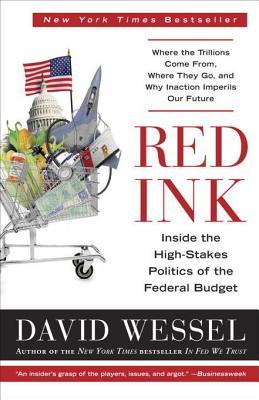
Red Ink
Inside the High-Stakes Politics of the Federal Budget
کتاب های مرتبط
- اطلاعات
- نقد و بررسی
- دیدگاه کاربران
نقد و بررسی

July 1, 2012
Accessible overview of America's contentious deficit politics by the Wall Street Journal's economics editor. Anticipating another summer of posturing and gridlock over the federal budget as President Obama's re-election hopes and the majority of both houses of Congress hang in the balance, Wessel (In Fed We Trust: Ben Bernanke's War on the Great Panic, 2009, etc.) provides a slender but highly informative volume designed to give voters a grip on what exactly is at stake in this corrosive battle. He begins by clarifying some common misunderstandings: Almost two-thirds of the budget gets spent automatically, with or without the consent or amendment of the current Congress; the U.S. defense budget exceeds those of the next 17 largest powers (including Russia and China) combined; Americans pay less of their income in taxes than citizens of any other developed nation, and have been paying less and less in taxes for 30 years. Wessel then tries to answer the most basic questions about the deficit: how we got here, where the money goes and comes from, and why we need to solve the problem sooner rather than later. He's the least successful on the last question; the best argument seems to be, "Because everyone thinks so." Wessel cites experts from left and right, including Paul Krugman and Paul Ryan, among others, without stating a preference for any side. (The hero of the story seems to be Defense Secretary Leon Panetta, a nonideological Democrat who, as a congressman, helped forge agreements that made the surpluses of the 1990s possible.) Without explicitly recommending a course, Wessel makes clear that a solution to the problem would necessarily be repugnant to all sides and would include some major changes to entitlement programs as well as increases in taxes for at least several years. Wessel doesn't tell you how to think, but he does give you the facts to think more clearly about what needs to be done.
COPYRIGHT(2012) Kirkus Reviews, ALL RIGHTS RESERVED.

August 1, 2012
Pulitzer Prize-winning journalist Wessel (economics editor, Wall Street Journal; In FED We Trust: Ben Bernanke's War on the Great Panic) presents a timely analysis of the U.S. federal budget. He examines the fiscal 2011 budget year, breaking down the allocation of federal money and revealing the current budget's unsustainability. Today, Wessel notes, federal spending is nearly six times what it was when FDR was first elected in 1932, approximately one out of every four dollars in the overall economy. He clearly and succinctly describes the vast scope of the budget, the budget deficit, and the almost unimaginable total national debt. He also discusses the politics and people behind the budget, citing insiders like White House Chief of Staff Jacob Lew, Congressional Budget Office Director Douglas Elmendorf, former Commerce Secretary Peter Peterson, and Defense Secretary Leon Panetta. VERDICT Wessel's unbiased, levelheaded approach will appeal to serious readers who understand that the federal budget cannot be managed like a family budget. He offers ideas for solving the crisis, but these would require the support of elected officials and a focus on working toward a responsible fiscal future. Highly recommended for all politics wonks and university libraries supporting political science and economics curricula.--Dale Farris, Groves, TXEducation
Copyright 2012 Library Journal, LLC Used with permission.

July 1, 2012
Anyone who's curious to know how the U.S. government managed to spend $3.6 trillion dollars in 2011 may be interested to learn about the inner workings of the federal budget and where the money goes. Economics expert Wessel breaks it down in layperson's terms. With the budget deficit being higher in 2011 than it has ever been, he explains the ever-widening gaps between government revenue and spending from the Great Depression until now, highlighting major historical milestones in budgetary strategy and the current situation. Despite four years in which the government actually had budget surpluses enough to pay off the federal debt, economic woes, costly wars, and other problems drove the budget back into the red, where it remains up to the present. The book explains the factors causing health-care spending to rise faster than the other areas of the federal budget, which forecasts an alarming trend for the future. Controversy over whether tax increases or spending cuts should be made to defense, Medicare, or Social Security spending provides fuel for great debate.(Reprinted with permission of Booklist, copyright 2012, American Library Association.)

























دیدگاه کاربران